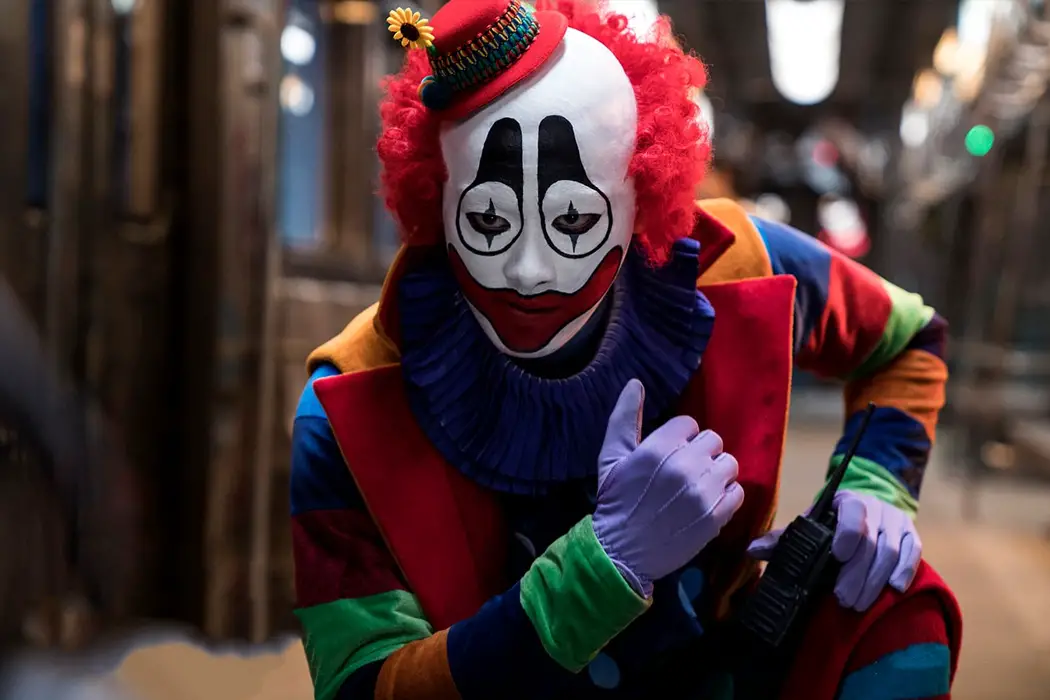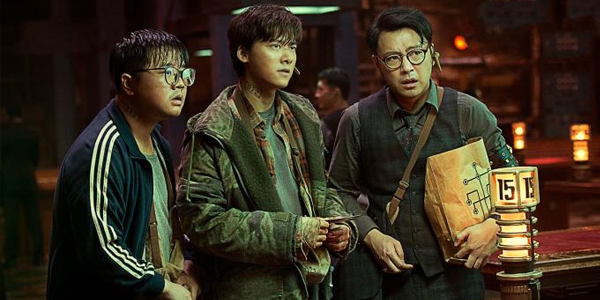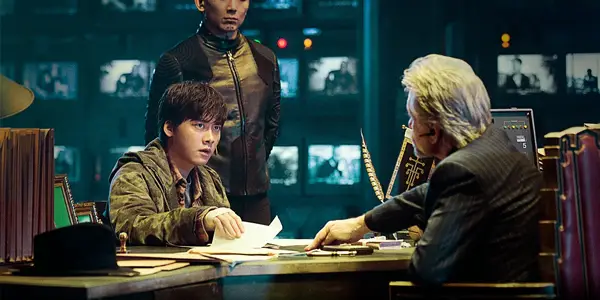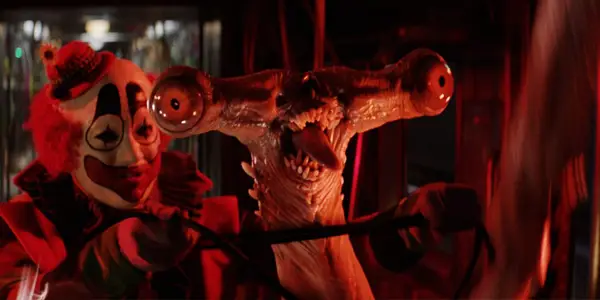ANIMAL WORLD: Clowns, Cards & Crazy Casinos

Alex is a 28 year-old West Australian who has a…
A Chinese adaptation of a Japanese manga might sound unconventional, but its probably the most normal aspect of Han Yan‘s Animal World, a truly insane but consistently entertaining mishmash of rock paper scissors, bug-eyed aliens, clown assassins and a check-cashing Michael Douglas. The film’s initial teaser trailer was incredibly intriguing, a cryptic montage where we saw a katana-wielding clown fluidly slicing up a subway cart full of disgusting aliens, whose dismembered limbs sprayed out spurts of liquified rainbows.
Props to the marketing department for productively using the film’s craziest section to get the audiences attention, a dream sequence from the first 10 minutes which was used to cover up what Animal World actually is – a convoluted gambling drama starring a math-solving Sherlock Holmes, as opposed to the kaleidoscopic superhero epic that we were promised.
Sweet Dreams Are Made Of This
Dream sequences have a tendency to feel lazy or unnecessary, excuses for filmmakers to either experiment with visual ideas without needing to literally link them to the central narrative, or similarly, an excuse to spell out a film’s themes or exposition in a fashion which would feel fake/lazy if delivered by characters outside the constructs of ‘dream logic’. Animal World, adapted from Nobuyuki Fukumoto’s manga Ultimate Survivor Kaiji, indulges in using its elaborate dream scenes for both of these purposes – and indulge does it.

The clown fantasy comes from a traumatic memory in Zheng Kaisi’s (a pleasant Li Yifeng) childhood, who at the tender age of 8, was forced to watch the animated show ‘Super Clown’ whilst his father was viciously murdered by unseen forces. This disturbing event lingers in Zheng’s mind as an internal defence mechanism, any confrontation or signs of distress trigger his cerebral ‘clown’ identity, viewing his opponents as morphing alien creatures (who were designed by Weta Digital).
Its an imaginative conceit, feeling like The Secret Life of Walter Mitty meets Men in Black – day dreaming as we save the day from aliens, something that all men have done in their spare time (I’ll admit to it). Unlike Walter Mitty’s lame day-dream sections though, Zheng’s vivid mental exploits are amazing to watch, so much so that they cast a vast shadow over the rest of the proceedings. Its a mixture of their purely manic energy, and that they never really have any clear-cut effect on the plot or Zheng’s growth as a character, to put it simply, they’re pretty, but pointless.
There’s a reason why Zheng has a tendency to descend into his bizarre internal tangents, as its the only realm where he’s actually a real hero to people. In reality, Zheng’s embarrassing gig as an arcade clown sees him dwindling his natural talents, his mother is in a prolonged coma and her medical bills are being aided by his doting girlfriend, nurse Qing (an adorable Zhou Dongu). Childhood friend and slimy real estate agent Li Jun (Cao Bingkun) proposes an ideal solution for his pal’s problems: sell Zheng’s apartment, and invest the money into an upcoming building site which would double the pair’s profits immediately.
The Real Story
After the scheme is revealed to be a scam, Zheng is left with one huge debt to pay, which is when destiny kicks in, arriving in the form of a ship with the same name (yes, its a little on the nose). He is then dragged into the lair of a cane-wielding billionaire Michael Douglas, whose offices feel like a steampunk interpretation of the multi-monitored palace of The Matrix’s Architect.
The hammy Douglas (whose able to talk to the Chinese cast via Babel Fish-like translation device) gives the bankrupt teen a pretty airtight proposal: if he wants to clear his mounting debt, Zheng must play his game, a Running Man-type scenario where instead of combatants killing each other, the participants must fight in elaborate games of rock, paper, scissors. Yes, its a very silly premise, but the film’s refusal to wink at the audience or acknowledge its own goofy nature helps in making its ludicrous plot easier to swallow.

Once on-board the beautifully decorated ship, Zheng has 4 hours to complete the game, whose rules are initially confusing, but clearly explained: each person has 3 stars and 12 cards, with the cards comprising of 4 sets of rock, paper and scissors. At each poker table, the game is played like any traditional game of rock paper scissors, but the winner of each turn is rewarded a star from their opponent.
To succeed after the time is up, each person must have at least 3 stars and no cards left (large on-screen graphics really makes sure the audience understands this unusual concept). When Zheng is immediately scammed out of 2 of his stars and most of his cards, he must use his untapped mathematical abilities to win, even if it means teaming up with his duplicitous friend Li Jun again.
Kooky Card Games
Those who cannot settle with the film’s restless personality will find this whole ordeal irritating, as the 140-minute runtime frequently switches from being a explosive action blockbuster (a destructive car chase imagined by a panicking Zheng is easily one of the best action set-pieces of this year), an intellectual heist picture and a high-strung gambling drama, all powered by the spirits of Guy Ritchie, Takashi Miike and 50 cans of Red Bull. As someone who personally enjoys watching smart people strategically solve scenarios by breaking them down and solving them logically (for example the entire Sherlock Holmes film series), I found it incredibly stimulating experience to see Zheng defeat his adversaries not with blind luck, but with actual intellect and considerate judgement.

In other hands, this material would’ve been straight up dead on arrival, but Han Yan’s determinedly stylistic approach and the impressive work of cinematographer Max Da-Yung Wang help sell this potent package of pure adrenaline. Its straight up aggressive at times, especially when Yan decides to put us in Zheng’s headspace during his frequent anxiety attacks, a process which involves the slowing down of time and intense camera moves that twist and turn us, making us feel just as disorientated as our nervous protagonist. The film’s “everything but the kitchen sink” approach means that not all of these decisions work, but if it achieves one thing, its that its a tremendous calling card for Han Yan as an action filmmaker, as the young director’s 2 previous films were romantic dramas, miles away from his audacious work here.
Conclusion: Animal World
I find it pretty ironic that a film about the art of misdirection managed to employ those same tactics in its marketing, a bait and switch deceit which advertised kinetic clown chaos, but instead gave us an equally bizarre gambling adventure. Despite its narrative instability, Animal World is an astounding technical achievement, with gratitude due in equal parts to Han Yan’s incredible eye for dynamic visuals and the work of the post production artists who helped embellish his ambitious vision.
It’s not perfect, but big bold swings like this never are – I’d take a messy, but genuinely innovative feature like this any day over the parade of generic blockbusters offered up at most matinees at the moment, like where else can I watch a psychopathic clown slice up a train cart full of mutated monsters this summer? Book Club maybe.
Have you had the chance to catch any new Chinese films this year? Let us know!
Animal World got a limited release in the U.S. and U.K. on June 29, 2018.
Does content like this matter to you?
Become a Member and support film journalism. Unlock access to all of Film Inquiry`s great articles. Join a community of like-minded readers who are passionate about cinema - get access to our private members Network, give back to independent filmmakers, and more.












